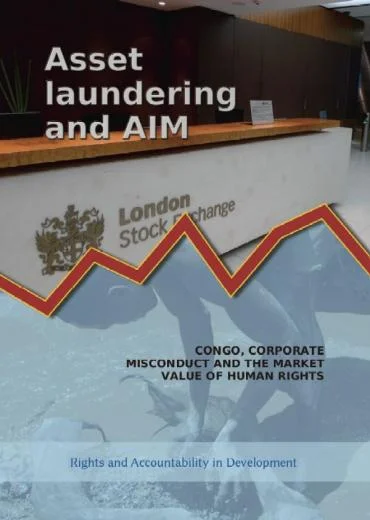Breaches of listing regulations on AIM?
In 2011 RAID raised concerns about possible breaches of listing regulations on London’s junior stock exchange, the Alternative Investment Market (AIM). RAID’s in-depth report unearthed the inadequate regulation of companies by the London Stock Exchange, and the blind eye turned to corporate abuses. After RAID’s critique, AIM Regulation set out further guidance for advisors.
In 2011, RAID raised concerns about possible breaches of listing regulations for London’s (junior) Alternative Investment Market (AIM), using as an example the Central African Mining & Exploration Company plc (CAMEC). CAMEC was able to trade on AIM despite the dubious provenance of its assets in the Democratic Republic of Congo, its reliance on a key manager and shareholder later named on EU and US sanctions lists, and its links with the Mugabe regime.
RAID raised concerns with the UK Financial Services Authority (FSA) and with AIM’s compliance department, AIM Regulation, in a confidential report, later published as Questions of Compliance: The conduct of the Central African Mining & Exploration Company (CAMEC) plc and its nominated adviser, Seymour Pierce Limited. They related to inadequate due diligence; conflicts of interest; the absence of reliable financial information; the disputed ownership of assets; the conduct and reputation of key managers and business associates; and the withholding of information material to the attractiveness of CAMEC’s shares.
RAID’s findings echo those of the UN Group of Experts on the DRC, which in 2006 drew attention to ‘insufficient due diligence’ that had allowed ‘individuals of unknown or questionable standing’ to become major shareholders in CAMEC and other companies. Besides exposing issues of non-compliance, the RAID report also highlights problems with the rules themselves – in particular the conflict of interest inherent in the role that nominated advisors are expected to play in regulating the market.
AIM Regulation and the FSA fail to address concerns
A year after the submission, AIM Regulation and the FSA had still not publicly addressed RAID’s questions. Both bodies cited ‘confidentiality’ as preventing them from letting RAID know the outcome of any investigation, or indeed whether an investigation was taking place. Accordingly, in July 2012 RAID published the original report in full, in order to bring its questions to the attention of a wider public. Simultaneously, RAID released a follow-up: Asset Laundering and AIM: Congo, corporate misconduct and the market value of human rights, which summarised the original report and included a detailed critique of AIM Regulation in the light of its failure to deal adequately with RAID’s questions.
After RAID’s critique, AIM Regulation set out further guidance for advisors
- RAID was concerned that the requirements for due diligence on substantial shareholders and controlling individuals were ambiguous. AIM now advises that the principles of due diligence on directors apply equally to key stakeholders.
- RAID identified many instances where price-sensitive information appears to have been withheld: AIM now emphasises the need for advisors to consider the ‘spirit and underlying purpose’ of rules governing the notification of price-sensitive information, and to follow up questions in a meaningful way.
- But AIM has never publicly determined CAMEC’s compliance with the rules.
RAID responded in Polishing the family silver to a consultation by the FSA on enhancing the listing regime under the main market. RAID drew attention to the use of AIM as a back door to avoid proper scrutiny.
European Union revises Transparency and Accounting Directives
In a parallel development, the European Union revised its Transparency and Accounting Directives to require extractive and logging companies to publish payments they make to governments. In the UK – as advocated by RAID – the directives will extend beyond the main regulated markets to include AIM.
The G8’s Lough Erne Declaration of 2013 holds forth the prospect of bringing increased transparency to company ownership, which should assist in identifying the beneficiaries of corrupt deals, provided the words are backed by action.
See also Hedge funds and sanctions compliance

